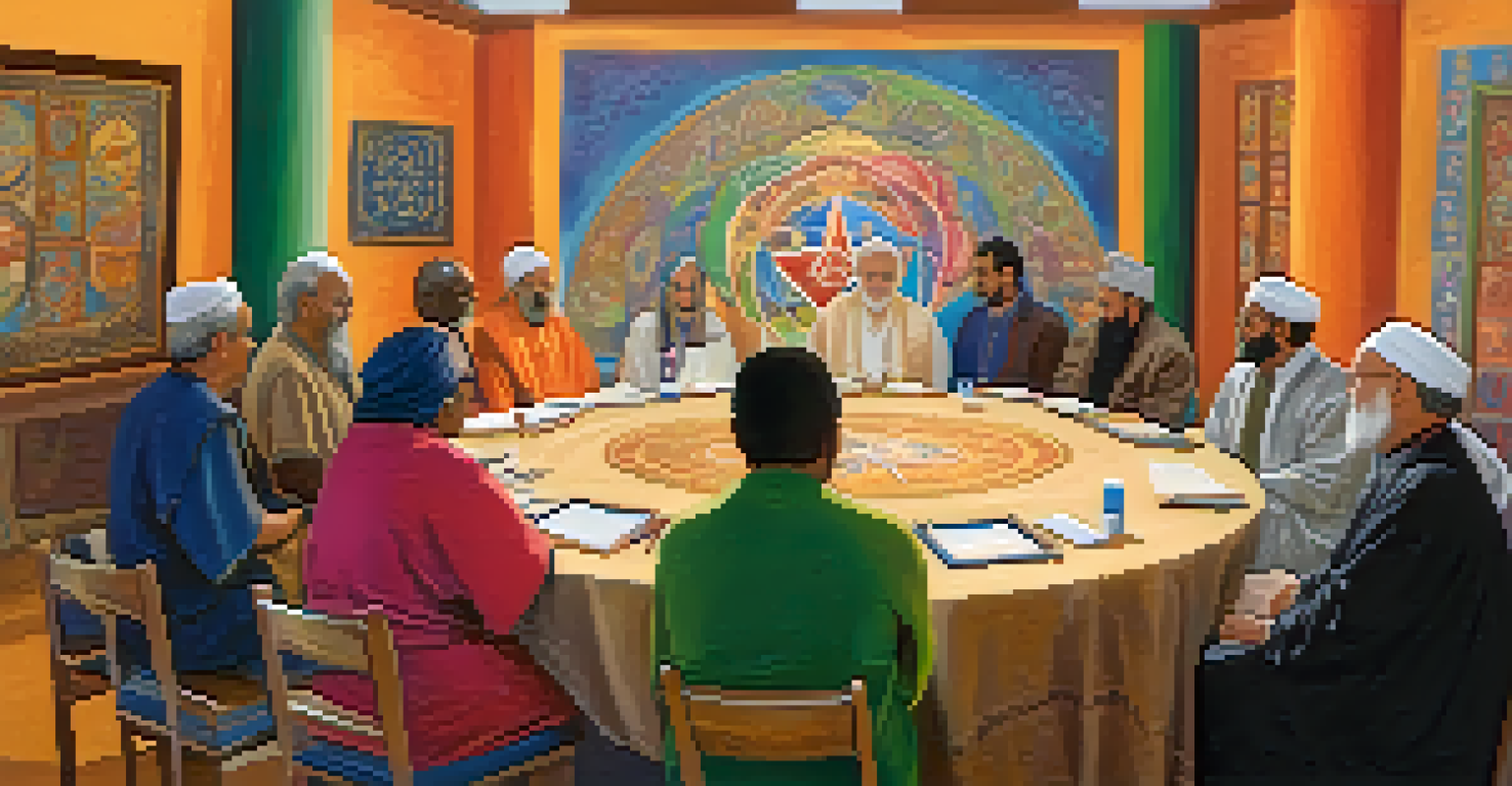Shared Spiritual Beliefs: A Foundation for Social Cohesion

Understanding Shared Spiritual Beliefs and Their Impact
Shared spiritual beliefs encompass the values and principles that bind a community together, transcending individual differences. These beliefs often stem from religious traditions, cultural practices, or common philosophical understandings. When individuals align on these spiritual tenets, it creates a sense of belonging and unity, essential for social cohesion.
Spirituality is not a religion; it is a way of life.
For example, communities that gather for shared rituals, such as prayer or meditation, often strengthen their bonds through collective experiences. These shared moments foster trust and deepen relationships, which are vital in creating a supportive environment. By understanding the essence of these beliefs, we can appreciate their role in nurturing social ties.
Furthermore, shared spiritual beliefs can act as a moral compass for communities, guiding behavior and decision-making. They promote compassion, empathy, and understanding, which are crucial for harmonious living. By highlighting these common values, communities can bridge gaps and foster inclusion among diverse groups.
The Role of Spirituality in Conflict Resolution
Spiritual beliefs can serve as powerful tools for conflict resolution, offering common ground even in times of disagreement. When individuals focus on shared values, they are more likely to engage in constructive dialogue rather than contentious arguments. This shift in perspective can lead to peaceful resolutions and a stronger sense of community.

For instance, during community disputes, mediators often invoke shared spiritual principles to remind parties of their common humanity. This tactic encourages a collaborative spirit, reducing the likelihood of hostility. By grounding discussions in spirituality, individuals can reframe conflicts as opportunities for growth and understanding.
Spirituality Fosters Community Unity
Shared spiritual beliefs create a sense of belonging and strengthen social ties within communities.
Moreover, recognizing shared beliefs allows communities to celebrate their diversity while finding unity in their spiritual practices. This approach not only resolves conflicts but also strengthens relationships, fostering an environment where collaboration thrives. Ultimately, the power of shared spirituality can transform divisive situations into moments of connection.
Creating Inclusive Spaces for Diverse Spiritual Practices
Inclusivity is crucial when it comes to shared spiritual beliefs, as it acknowledges the variety of practices within a community. Creating spaces where diverse spiritual expressions are welcomed fosters a sense of belonging for everyone involved. It’s essential to recognize that different beliefs can coexist harmoniously, enriching the community's cultural tapestry.
The greatness of a community is most accurately measured by the compassionate actions of its members.
For example, community centers that host interfaith dialogues or spiritual workshops can encourage understanding among various groups. These initiatives promote open conversations about beliefs, reducing misconceptions and fostering respect. By embracing diversity, communities can strengthen their social fabric, as individuals learn from one another.
Moreover, inclusive spiritual spaces can serve as platforms for collective action, where shared values inspire community service and social justice initiatives. When people come together, motivated by their spiritual beliefs, they can work towards common goals that benefit everyone. This unity not only enhances community ties but also contributes to the overall well-being of society.
The Connection Between Spirituality and Mental Health
There’s a growing body of research that highlights the positive impact of spirituality on mental health. Shared spiritual beliefs can provide individuals with a sense of purpose and belonging, both of which are crucial for emotional well-being. This connection illustrates how community cohesion can influence personal health outcomes.
For instance, individuals who engage in communal spiritual practices often report lower levels of stress and anxiety. The support and understanding found in such environments can be incredibly healing. When people feel connected to something greater than themselves, it can foster resilience in the face of life's challenges.
Conflict Resolution Through Spirituality
Spiritual beliefs can facilitate constructive dialogue and peaceful resolutions during community disputes.
Additionally, spiritual communities often serve as support networks, offering guidance and resources during difficult times. These networks can help individuals navigate personal struggles, reinforcing the idea that they are not alone. By prioritizing shared beliefs, communities can enhance both their social cohesion and the mental health of their members.
Spirituality as a Catalyst for Community Service
Shared spiritual beliefs often inspire individuals to engage in community service, fostering a spirit of giving and support. Many faith traditions emphasize the importance of helping others, which can lead to collective efforts aimed at improving the community. This sense of duty reinforces social bonds and promotes a culture of care.
For example, groups united by spiritual values may organize food drives, volunteer programs, or outreach initiatives to support those in need. These acts not only meet immediate needs but also strengthen the connections between individuals. The shared goal of community service can create a ripple effect, encouraging others to join in and contribute.
Moreover, community service rooted in spirituality often emphasizes compassion and empathy, qualities that are essential for social cohesion. When individuals work together for a common cause, they build trust and understanding, which are vital for a thriving community. Ultimately, shared spirituality can transform community service into a meaningful expression of collective values.
The Importance of Education in Promoting Spiritual Values
Education plays a crucial role in promoting shared spiritual values within communities. By incorporating discussions about spirituality and ethics into educational programs, we can cultivate a deeper understanding of diverse beliefs. This awareness fosters respect and appreciation for different spiritual practices, which is essential for social cohesion.
For instance, schools that encourage students to explore various spiritual traditions can help break down stereotypes and misconceptions. When children learn about the values of compassion, empathy, and community service, they are more likely to carry these principles into adulthood. This foundation can significantly impact future generations' ability to coexist harmoniously.
Education Promotes Spiritual Values
Integrating discussions on spirituality in education fosters respect and understanding for diverse beliefs.
Furthermore, educational initiatives that focus on shared spiritual values can create opportunities for intergenerational dialogue. Involving elders in discussions about spirituality can enrich the learning experience and create bonds across generations. By prioritizing education on shared beliefs, we empower individuals to cultivate a more cohesive and understanding community.
The Future of Shared Spiritual Beliefs in Society
As society continues to evolve, the role of shared spiritual beliefs remains relevant in fostering social cohesion. In our increasingly diverse world, these beliefs can serve as a unifying force, promoting understanding and collaboration among different groups. Looking ahead, it’s essential to find ways to nurture and celebrate these shared values.
For example, community events that highlight various spiritual practices can create opportunities for dialogue and interaction. By showcasing the richness of different beliefs, we can inspire greater appreciation and connection among individuals. This approach not only strengthens community bonds but also encourages a culture of respect and inclusivity.

Moreover, as we confront global challenges, shared spiritual beliefs can motivate collective action for social justice and environmental stewardship. By coming together around these values, communities can address pressing issues and work towards a more equitable and sustainable future. Embracing shared spirituality will be key to building resilient and harmonious societies.